Ten Essential Vangelis Albums to Open the Star Gates.
by John Diliberto 05/23/2022
 When Vangelis passed on May 17, 2022 at the age of 79, he left behind a musical legacy that will keep echoing for decades more. Unlike his contemporary, Klaus Schulze, who left nearly 60 studio and live albums, soundtracks and 110 individual CDs compiled into 6 multidisc box sets, Vangelis was circumspect in his offerings. He left 23 studio albums, plus 12 soundtracks and two handfuls of collaborations, all released since his official debut, the completely obscure, and pretty unlistenable, Fais que ton rêve soit plus long que la nuit (“Make Your Dream Last Longer Than the Night,”) a 1972 album inspired by the 1968 Paris student riots.
When Vangelis passed on May 17, 2022 at the age of 79, he left behind a musical legacy that will keep echoing for decades more. Unlike his contemporary, Klaus Schulze, who left nearly 60 studio and live albums, soundtracks and 110 individual CDs compiled into 6 multidisc box sets, Vangelis was circumspect in his offerings. He left 23 studio albums, plus 12 soundtracks and two handfuls of collaborations, all released since his official debut, the completely obscure, and pretty unlistenable, Fais que ton rêve soit plus long que la nuit (“Make Your Dream Last Longer Than the Night,”) a 1972 album inspired by the 1968 Paris student riots.
Within his main body of work is a distinct Vangelis sound, marked by sweeping electronic strings, bombastic dynamic shifts, thundering percussion, and ostinato sequences. But he stretched, bent and mutated those characteristics into widely divergent sounds over the years. Albums like Beauborg and Invisible Connections are completely electronic freak-outs that could’ve come from the Columbia-Princeton Studios or Radio Cologne. That sound is counterbalanced by his sweeter music, like the score to Chariots of Fire, and his pop work with Yes singer Jon Anderson. Most electronic musicians who employ symphonic textures wind up sounding pseudo-classical. When Vangelis does it, he just sounds like Vangelis. Vangelis is the 6th of 30 Icons of Echoes. Here are ten reasons why:
Ten Essential Vangelis Albums to Open the Star Gates
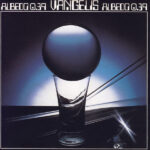 1- Albedo 0.39
1- Albedo 0.39
Albedo 0.39, along with Spiral, is one of Vangelis’s most sequencer-driven albums, revealing the Zeitgeist of the time, 1975, when Tangerine Dream, Klaus Schulze and Jean-Michel Jarre were releasing their opuses. Albedo contains several of Vangelis’s best-known themes, including the space explosion of “Pulstar.” He often said he didn’t compose space music, but there aren’t too many artists noted by NASA upon their deaths. This album is one of the reasons why.
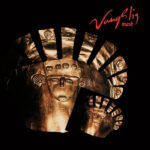 2- Mask
2- Mask
Mask is a dramatic choral work from Vangelis. The choir is uncredited, but is likely the English Chamber Choir with lead tenor Guy Protheroe. Referencing Carl Orff and perhaps Magma, Vangelis orchestrates dramatic choral refrains that can sound like storm troopers on the march in “Movement 1,” or like imploring gothic voices from the heavens on “Movement 3.” The hypnotic marimba cycle and string bass groove of “Movement 4” features a solo voice singing what sounds like a gothic liturgical chant, but is actually made-up syllables. I bought Mask on CD before I even had a CD player.
 3- Heaven and Hell
3- Heaven and Hell
Released in 1975, Heaven & Hell is a signature achievement for Vangelis. Composed with just a couple of synthesizers, a ton of percussion, and the English Chamber Choir, it’s a dynamic and heroic work. From the opening synthesizer clarion, the choir calls out to the heavens, synthesizers spin in counterpoint to tuned percussion, and timpani and cymbals crash on the shores of Vangelis’s electronic orchestra. And check out Vangelis’s uncharacteristically jazzy Fender Rhodes keyboard playing. It also includes Jon Anderson’s sweet interlude between movements, “So Long Ago, So Clear.”
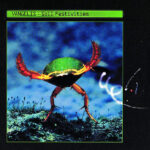 4- Soil Festivities
4- Soil Festivities
Soil Festivities is the most “ambient” of Vangelis albums and his most underrated. Inspired by life’s processes, Vangelis uses repetitive minimalist patterns, nature sounds and flute-like keyboard voices, to create a seamless, contemplative journey that eschews his usual penchant for both sweetness and bombast. Released in 1984, it’s not a meditative piece but an evolving journey over its five movements.
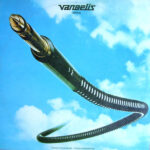 5- Spiral
5- Spiral
Spiral, released in 1977, is in the vein of Albedo 0.39, but only contains five long compositions, ranging from the sequencer-driven title track to the quietly poignant “Ballad,” with its vocoder voice sounding a lament from within Vangelis’s circuitry. “Dervish D” is a dance for space, with a bouncing sequencer rhythm and one of the artist’s most earworm-like melodies. “3+3” concludes the album on a joyful frolic with a melody in 3/4, matched to a time-stepping sequencer pattern that eventually rushes us off into – where else – space. I thought this was a good album when it was released in ’77, but maybe a bit too close to Albedo 0.39, but now I hear it as a masterwork of sequencer-driven music in its own right.
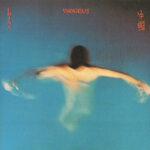 6- China
6- China
China marked a real shift for Vangelis. Ethnic instruments had always been part of his palette, but he’d never developed it as deeply as he did on this 1979 CD. He plays Chinese flutes, the koto, and other instruments, mixing them with his sweeping, cinematic synths. Sometimes the pentatonic scales have the whiff of cliché, and Vangelis often indulges his bombastic side, but China is also full of heroic melodies, delicate interplay of synthesizer and acoustic instruments, and an atmosphere that makes the country of China seem even more otherworldly than it already is.
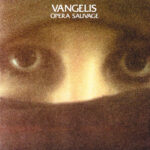 7- Opera Sauvage
7- Opera Sauvage
Released in 1979, Opera Sauvage is the score for a nature documentary by French filmmaker Frédéric Rossif. It contains one of Vangelis’s best known songs, the poignant “L’enfant.” It’s a simple pentatonic theme, with piano chirping out the sparse melody over a one-note synthesizer ostinato, yet it’s powerfully evocative and hymn-like. Used in the film, The Year of Living Dangerously, it stole all the attention from Maurice Jarre’s actual soundtrack.
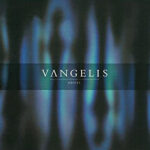 8- Voices
8- Voices
Voices arrived in 1995 after a four-year hiatus from studio recordings. It’s an instantly recognizable set full of his trademark sequencer rhythms and orchestral synthesis. Voices reestablished Vangelis’ preeminence as a master of music drama and atmosphere, teeming with heroic synthesizer melodies and inventive choral arrangements. In addition to five instrumentals, there are three more song-oriented vocal tracks, one each from Paul Young, Caroline Lavelle, and an ethereal lost-in-space track by Stina Nordenstam, “Ask the Mountains.”
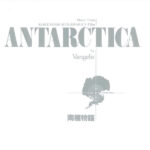 9- Antarctica
9- Antarctica
This is the score to a little-seen 1983 film by Koreyoshi Kurahara about a failed Japanese mission to Antarctica in 1958. Vangelis picks up on the white-on-white landscapes, vast ice formations and chilled environment. The title theme is a heroic work, while other tracks like “Antarctic Echoes” are full of the quiet, sweet repose that Vangelis frequently explores. Recoded just before his transition to digital synthesizers, you can hear the subtlety that Vangelis gets from his keyboards with the Chinese flute-like line on “Song of White.”
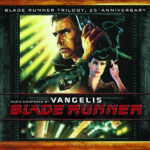 10- Blade Runner
10- Blade Runner
Following on the heels of his lush, romantic score to Chariots of Fire, Vangelis composed this darker, edgier soundtrack in 1982 for Ridley Scott’s archetypal science fiction thriller. Vangelis couched his electro-symphonic score in percussive rhythms and shadowed timbres. This is the album I hear cited most often by electronic musicians as an influence. It was reissued in 2007 as a three CD set with the complete soundtrack.
One album not on this list is his Oscar-winning score to Chariots of Fire. While the soundtrack is brilliant, all it’s elements are heard to better effect on other solo works. Same could be said for Blade Runner: it was a dynamic and evocative score for this dystopian sci-fi-film, but listen to all the other selections here and you better understand the core of Vangelis’s soul and creativity.
See John Diliberto’s Tribute to Vangelis

How can you leave The City off this list!?
I thought there was a lot of cliched material on that album in an attempt to evoke contemporary music of the time.
You missed See You Later from 1980, who has marvellous tunes as the main title and Suffocation!
Not missed but I’m glad you like it.
Personally, I would’ve had Ignacio on the list somewhere.
Okay. Which album would you take out then?
In my opinion, “ Le Apocalyse de Animaux “
Is Vangelis’s very best. So simple ,sweet and spontaneous, it has all the earmarks of what was to come but parred down to the utter basics of the Maestro
I won’t argue with you. That is a connoisseurs choice!
Hey… where is Conquest of Paradise?? Chariots of Fire ..
Those are by no doubt between his five greatest albums … who put this list?
I believe my name is on it as the author of the list. Those are good albums. I explained the exclusion of Chariots. And this is what lists are for. Discussion.
Oceanic is pretty good also
I agree.
Every Album Vangelis released is nothing more than
“MASTERPIECES OF BEAUTIFUL MUSIC !”
REST IN HEAVENLY PEACE AND MAY GOD SPEED.
My first Vangelis love was Aphrodite’s Child heard in1975. One listening to Aegean Sea and he had me ever since. Thank Carl Sagan’s wisdom for spreading Space Music to the stars! Pardon me, I’ve got to listen to Direct once more….
Conquest of Paradise should have been here. Of course, it is a matter of taste. For me it is better than Chariots (but both should have been in the top 10, if not in the top 5, in my opinioj of course ).
It’s a toss-up, but you could be right. It is a great album.
Agreed,Conquest of Paradise should be definitely in to 5.
I came to Vangelis by way of the album “Earth”, and the band Aphrodite’s Child. I have managed to collect most if not all of his works. It’s hard to limit the best to a top ten. Still like listening to Earth, Spiral, and a lot of others.
The more I listen to his music the more I enjoy it.
My first discovery of Vangelis was while I was living in Salamanca Spain in the 70’s. Amazing sound in all his evolution thru the years! It surprises me that in USA, Vangelis is not as well recognize, except for his movie soundtracks. Vangelis and all his music will be remembered as unique creations by a very talented genius!